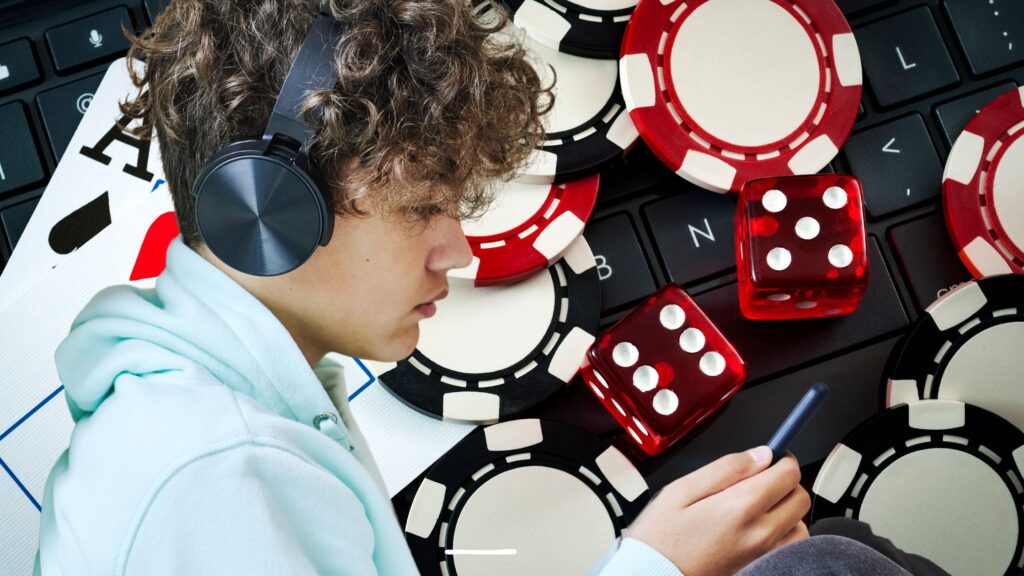Shady online casinos disguised as harmless games are targeting children, blurring the line between play and addiction.
A Sky News investigation revealed a slew of online casinos aren’t just accepting dollars—they’re targeting kids flush with Robux.
Robert, 14, was one of the youngsters pulled into this murky world after spotting an ad for a Roblox-linked gambling site on social media. What started as a casual gaming hobby turned into a gambling habit before he even realized what was happening.
“I didn’t even know what gambling was,” he told the news organization.
Like many kids, he was lured by the promise of easy money. It started small: 100 Robux—just over a dollar—deposited into BloxFlip, a gambling site that converts Robux into betting currency. But after losing his first wager, he kept depositing more, chasing his losses. Before long, it became a nightly ritual with his friends, complete with high stakes and devastating fallout.
One friend threatened suicide after losing 20,000 Robux (around $225) on a single roulette spin. Too scared to tell their parents, the group tried to handle the situation alone.
“We just tried to calm him down ourselves,” Robert said.
For kids like Robert, the line between play and addiction blurs fast. And the platforms they’re using don’t make staying on the right side of that line any easier.
Casinos in disguise: the dark side of Roblox
At first glance, sites like BloxFlip might look like just another quirky Roblox add-on. But under the surface lies a calculated system designed to suck kids into gambling.
Here’s how it works: Users transfer their Robux to the gambling site, which converts the currency into virtual betting chips. These chips are then used for games like roulette or blackjack, simulating the thrill of a real casino.
Those chips can be converted back into Robux or even cryptocurrency, which can be exchanged for real money. It’s a seamless pipeline from innocent gaming to real-world gambling.
Most of these sites require nothing more than a Roblox account. Age verification? Barely there—usually just a box to tick claiming you’re over 18, with no enforcement to back it up.
The result? A system practically engineered to lure underage users into betting their pocket money or savings meant for in-game outfits.
Chasing the high: why kids keep coming back
At the heart of this issue is the brain’s dopamine system, a chemical reward mechanism that’s easily exploited by gaming and gambling alike. Platforms like BloxFlip are designed to trigger a dopamine rush with every win, no matter how small. But when the losses come—and they inevitably do—the brain craves that next win even more, pushing users to keep playing.
For kids, this cycle is especially dangerous.
Their developing brains are still building impulse control and decision-making skills. The result? They’re being trained to associate risk-taking with pleasure, laying the groundwork for adult gambling addiction. In Robert’s case, it started with a small win, but it wasn’t long before he was chasing that initial thrill, depositing more and more Robux.
From games to gambling: the bigger picture
This isn’t just a Roblox problem.
We’ve seen similar patterns in other platforms that gamify high-stakes decisions. Remember Robinhood during the pandemic? Confetti animations for trades and instant gratification for wins encouraged impulsive behavior among inexperienced investors—and in one case ended in tragedy. Or Reddit’s WallStreetBets, where risking it all became aspirational. Both exploit the brain’s reward system to hook and keep users engaged.
The stakes are even higher for younger audiences. These kids are being conditioned to take bigger risks, crave higher rewards, and ignore the consequences—all before they’re old enough to understand what’s at stake.
And the results can be severe.
A study published in BMC Psychiatry in 2019 found that teens who gamble are two to four times more likely than adults to develop gambling problems. Among young problem gamblers, 30% experience heightened psychological distress, including anxiety and depression, with some even reporting suicidal ideation at twice the rate of their peers. Nearly 40% of adolescents with gambling issues report strained family relationships and poor academic performance.
Worse yet, these teens are three times more likely to borrow or steal money to sustain their habits, blurring the line between desperation and delinquency.
Roblox’s losing battle against rogue casinos
Meanwhile, Roblox is scrambling to protect its reputation as a safe, kid-friendly platform. The company claims it’s cracking down on illegal gambling sites tied to Robux, tightening security, and implementing stricter rules. But for every site it shuts down, another pops up, rebranded, and ready to exploit kids all over again.
Parents and regulators are left chasing shadows while the damage to kids like Robert continues to mount. “Nothing else felt the same,” Robert told Sky News of his gambling habit. “I just wasn’t getting the same feeling from other things compared to when I was gambling at home on a Roblox casino.”
Though he’s walked away from Roblox gambling, he admits he might step into a legal casino someday. Would he feel that way if he’d never gambled with Robux?
“Probably not,” he said.
